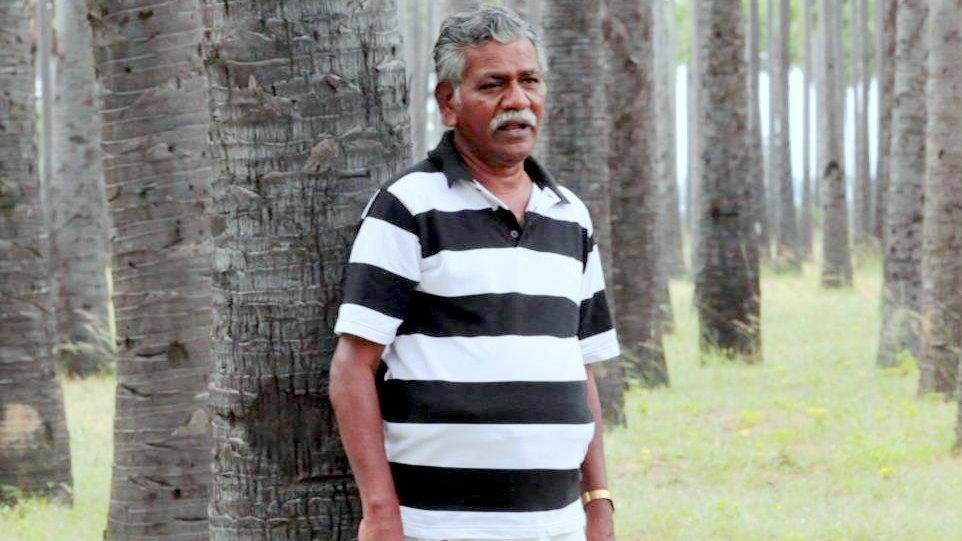Director: Balaji Tharaneetharan
Cast: Megha Akash, Kalidas Jayaram, Lakshmi Priya Menon
There is a one liner in Balu Mahendra’s Sathi Leelavathi that goes,”Appa illama naa epdi? Avatharama?“. That’s Balaji Tharaneetharan’s Oru Pakka Kathai in one line.
The film opens with a middle-class household in Triplicane (much can be read into the choice of this multicultural old Madras town), a family of believers. The husband and wife are listening to a kathakalakshepam – insisting the Brahmin storyteller to expand on Bhagavatham – with a small attentive crowd of friends and neighbours. Balaji opens with a tracking shot as we go past them into the room belonging to the two daughters, the college student Meera (Megha Akash) and her younger sister. We are also introduced to a subplot of a kid living upstairs who believes he is god’s incarnation on earth, like Krishna of Bhagavatham. Meera is dating Saravanan (Kalidas Jayaram), their respective families are aware and waiting for Saravanan to get a job. His parents are believers too, they stand in queue to meet a godman, one whom central ministers and the Prime Minister patronise (cheeky how offhand this information is tossed at us). We then see Saravanan and Meera together and she plants a kiss on his cheek. She misses her period.
The one line reference is not the only Balu Mahendra-esque touch in Oru Pakka Kathai. Balaji’s frames and aesthetics are incredibly authentic, the actors devoid of facial embellishments and he films much of the first half within this tiny household. Handheld camera takes us through rooms, as we follow Meera and her mother (a superb Lakshmi Priya Menon). There is palpable tension in the air and Oru Pakka Kathai breathes in silence, only the background score for company. Everything is conveyed through visuals. For example, during the kathakalakshepam, Meera’s mother notices that she has left her college ID which probably means she’s skipping class to meet Saravanan. This adds to her concern when Meera informs her that her period is four days late. From here, the interiors of the house brim with anxiety, visible on the mother’s face, veiled in Meera’s. There is more to the visual flair. Sethu confides to his classmate in school that he is an avatharam, god among mortals. Seconds before this, we see the classmate playing with his pencil, the sharp end directly pointing into the camera at us, he is holding them so close to his eyes and we all know what that can do. That’s the moment the classmate (his forehead smeared with sandalwood) becomes a believer in Sethu.
Such is Balaji’s control over his material that the film never tips towards satire but stays focused on its commentary on religion and Brahminical ideologies (notice the accents). Sethu’s friend/devotee becomes more rabid than Sethu himself. Sethu wonders if he is a god, there must be evil to vanquish – god’s lone purpose to exist. The film is never not serious (even gets darker towards the end) though it packs in as much black humour as possible.
There are many throwaway moments like a regressive male RJ apologising – “eppovum pola oru flow la solliten”. Meera gets pregnant (you knew that, right?) and the two male doctors declare that she is weak (to nudge the families against abortion) and if the pregnancy is aborted, her future is at risk. The second doctor is judgemental to boot. Saravanan and Meera finally go to Dr Valliammai, the only doctor – a woman – who asks them all the relevant questions without prejudice.
The two people who talk in progressive terms in the film – the woman ob-gyn and a lawyer who shows up in the latter half when matters take legal recourse – have the same Buddha statue in their offices. An incarnation like Krishna himself or Meera (a name relevant to the Hindu devotee of Lord Krishna) as Madonna with her child (she goes to ‘Christ’ College!) shores up the underlying hypocrisy in religiously motivated beliefs. This film might invite questions on whether it is anti-abortion (but with an abortion, there is no film) but it wants you to wonder about the very ambiguity – “oh dear, how can you kill a life, it’s a sin!” “But then, it is a virgin birth, god’s own miracle child, do not abort!”
Recommended
This was supposed to be Balaji’s sophomore film after his rollicking debut, and we can see that the light handling of a dark subject has gradually transformed into something more daring. It doesn’t even get preachy and is backed by solid filmmaking – a particular Gunaa like 360 degree shot that tracks an argument. Again, minimal dialogues, punchy visuals, great returns.
If only this film had released on time with better publicity backing it instead of this last minute 2020 OTT push on Zee5.
****
The Oru Pakka Kathai review is a Silverscreen original article. It was not paid for or commissioned by anyone associated with the film. Silverscreenindia.com and its writers do not have any commercial relationship with movies that are reviewed on the site.



